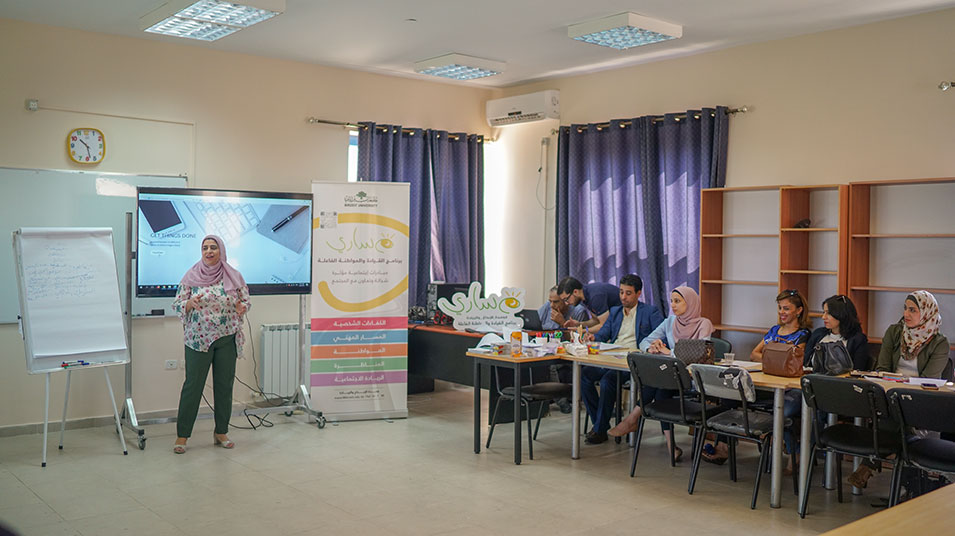‘Masari’ cohort begins final stage of program with community-based initiatives
Representatives of Palestinian civil-society institutions discussed community issues that Birzeit University students could help solve as part of the university’s Leadership and Active Citizenship Program “Masari” in a workshop organized by the Innovation and Entrepreneurship Unit (IEU) on Thursday, August 29, 2019.
In this workshop, chaired by IEU Labor Market Relations Coordinator Suhair Morar, 25 community and grassroots organizations explored with university staff members ways through which students enrolled in “Masari” can help tackle issues that affect their immediate environments and the broader Palestinian society.
“Masari” is a three-year program that aims to incentivize students from all majors to plan their lives and engage with their surroundings as integral members of the Palestinian community. It comprises three years: the first focuses on self-exploration, self-discovery, self-awareness, and self-management through Personal Competencies and Career Path stations; the second year emphasizes the other and the community by promoting active citizenship skills – diversity, empathy, and sharing – through Debating and Citizenship stations.
The program’s third year focuses on the development and implementation of student-led community initiatives that stem from the students’ outlooks on Palestinian national contexts and priorities.
As part of the third year, the university signed agreements with several civil-society institutions — among them the Ramallah and Al-Bireh Chamber of Commerce, Ramallah Municipality, and Jericho Municipality — to coordinate students’ community engagement efforts with those of Palestinian grassroots and community-based organizations.
Mirvat Bulbul, the university’s vice president for administrative and financial affairs, highlighted the third year of “Masari” as the culmination of the program, the stage where students utilize the skills and expertise they learned across several learning stations to tackle issues affecting their communities.
Bulbul emphasized that the program’s unique, holistic nature allows students to develop skills that last for a lifetime; it encourages them to employ a design-thinking approach to the problems and issues they address while engaging as active citizens in the Palestinian community. She explained that the program’s distinctive structure helps students attain and build sustainable, life-long competencies and skills through which they can help develop their communities.
“The Social Entrepreneurship stations illustrate the ethos of the program as students, facilitators, and institutions and organizations work together to find sustainable solutions to societal and community issues, with each constituent developing their skills and propping up other parts,” explained Bulbul. “Sustainability and team work in particular,” she added, “figure significantly in the program’s design and methodology.”
“The program improves with each new student, facilitator, or partner organization, as each one of them influences and is influenced by the others,” Bulbul said, highlighting the program’s reflexive, community-based learning nature. She called on students to enroll in the program and build lasting competencies that they can use to serve community causes.
George Yerousis, the IEU director, said that the workshop introduced partner organizations to the Leadership and Active Citizenship Program’s aims, goals, methodology, and learning stations.
Each partner organization presented three community issues they hope to resolve with the students’ help, Yerousis added, noting that the issues discussed relate to pollution and garbage disposal, to human rights and education, and to water and energy consumption, among others.
“Working with community and grassroots organizations on issues that affect their society allows students to creatively and organically practice the skills and expertise they gained in ‘Masari’ and to find solutions to real-life issues and problems,” said Yerousis. He stressed that the program gives students the space to develop design-thinking skills that allow them to be “active citizens and future leaders of the Palestinian community.”
Atef Shkokani, the IEU projects coordinator, gave the attending representatives a brief overview of the “Masari” portal, the platform where companies can submit proposals for social initiatives and students can choose which ones they would like to support and implement.
Susan Burbar, Birzeit Municipality’s press officer, lauded the university’s community engagement efforts and noted that the district’s participation constitutes part of its strategy to encourage constituent participation in its plans to combat community issues.







